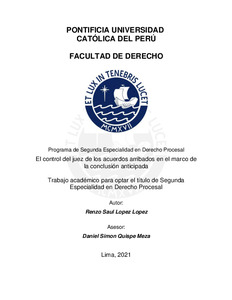| dc.contributor.advisor | Quispe Meza, Daniel Simón | |
| dc.contributor.author | Lopez Lopez, Renzo Saul | |
| dc.date.accessioned | 2022-04-05T21:16:51Z | |
| dc.date.available | 2022-04-05T21:16:51Z | |
| dc.date.created | 2021 | |
| dc.date.issued | 2022-04-05 | |
| dc.identifier.uri | http://hdl.handle.net/20.500.12404/22083 | |
| dc.description.abstract | Este artículo tiene como objetivo analizar los límites del control judicial sobre los acuerdos
arribados por las partes dentro de la conclusión anticipada, específicamente, en el supuesto
en que el juez rechaza la pena consensuada para establecer una superior, para ello, en base a
una metodología dogmática, se ha hecho una revisión de la doctrina, legislación y
jurisprudencia vinculada con dicha institución procesal. En esa línea, este trabajo académico
se divide en tres partes.
En primer lugar, se analizará la figura de la conclusión anticipada para entender sus
principales características dentro de nuestro ordenamiento jurídico, por lo que ahondaremos
en su naturaleza jurídica, tipología, regulación y diferencias y similitudes que tengan con
otras figuras procesales. En segundo lugar, se hace una revisión del control judicial que se
ejercer sobre los acuerdos generados en este contexto, centrándonos en el control del quatum
de la pena consensuada. Finalmente, a partir de la facultad que tiene el juez de imponer una
pena superior a la acordada por las partes, se analiza los límites de dicha potestad que se
vinculan con los principios de legalidad, de proporcionalidad, acusatorio y de congruencia.
Esto con el fin de que el juez no emplea dicha facultad de forma arbitraria. | es_ES |
| dc.description.abstract | The purpose of this article is to analyze the limits of judicial control over the agreements
reached by the parties within the plea barganing, specifically, in the case in which the judge
rejects the agreed penalty in order to establish a higher one. To this end, based on a dogmatic
method law, a review of the doctrine, legislation and jurisprudence related to this procedural
institution. In this line, this academic work is divided into three parts.
First, the figure of the plea barganing will be analyzed in order to understand its main
characteristics within our legal system, so we will delve into its legal nature, typology,
regulation and differences and similarities with other procedural figures. Secondly, we
analyze the judicial control that is exercised over the agreements generated in this context,
focusing on the control of the quatum of the consensual sentence. Finally, based on the power
of the judge to impose a sentence higher than that agreed by the parties, the limits of this
power are analyzed, which are linked to the principles of legality, proportionality, accusatory
and congruence. The object is to ensure that the judge does not use this power in an arbitrary
manner. | es_ES |
| dc.language.iso | spa | es_ES |
| dc.publisher | Pontificia Universidad Católica del Perú | es_ES |
| dc.rights | info:eu-repo/semantics/openAccess | es_ES |
| dc.rights.uri | http://creativecommons.org/licenses/by-nc-nd/2.5/pe/ | * |
| dc.subject | Procedimiento penal--Perú | es_ES |
| dc.subject | Administración de justicia--Perú | es_ES |
| dc.subject | Jueces--Perú | es_ES |
| dc.subject | Proporcionalidad en derecho | es_ES |
| dc.title | El control del juez de los acuerdos arribados en el marco de la conclusión anticipada | es_ES |
| dc.type | info:eu-repo/semantics/bachelorThesis | es_ES |
| thesis.degree.name | Segunda Especialidad en Derecho Procesal | es_ES |
| thesis.degree.level | Título Profesional | es_ES |
| thesis.degree.grantor | Pontificia Universidad Católica del Perú. Facultad de Derecho | es_ES |
| thesis.degree.discipline | Derecho Procesal | es_ES |
| renati.advisor.dni | 70437387 | |
| renati.advisor.orcid | https://orcid.org/0000-0002-5979-4744 | es_ES |
| renati.author.dni | 75154275 | |
| renati.discipline | 421109 | es_ES |
| renati.level | https://purl.org/pe-repo/renati/level#tituloSegundaEspecialidad | es_ES |
| renati.type | https://purl.org/pe-repo/renati/type#trabajoAcademico | es_ES |
| dc.publisher.country | PE | es_ES |
| dc.subject.ocde | https://purl.org/pe-repo/ocde/ford#5.05.01 | es_ES |






